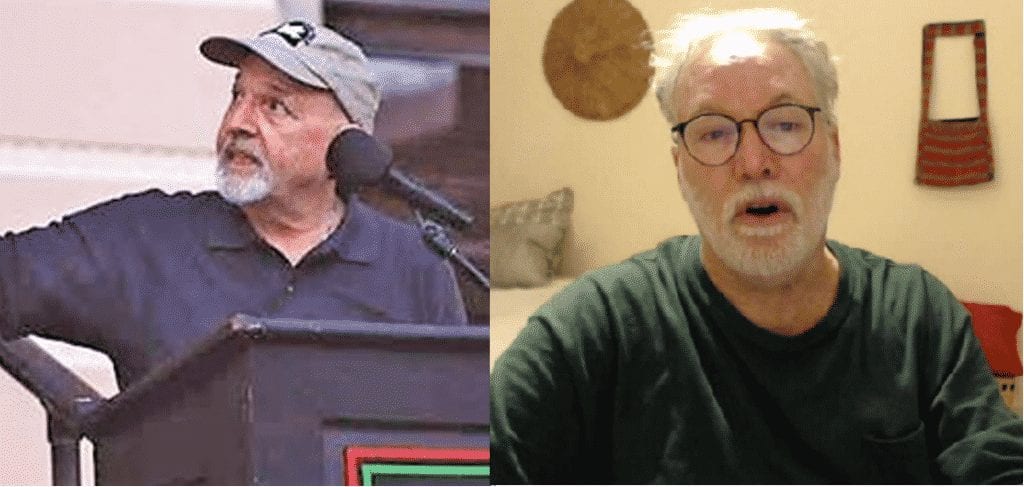By Peter Schwarz, wsws.org
Dateline: 31 January 2018

After Theresa May in the UK, Angela Merkel deserves the top spot for abject betrayal of the common people and service to the international plutocracy.
As Germany’s ruling elite conspires to form a new government to slash workers’ wages, attack democratic rights and remilitarize the country, the working class is giving its response in the form of the country’s biggest strike movement in 15 years.
On Wednesday, more than 65,000 workers in Germany’s metal and electrical industries will strike for 24 hours. On Thursday and Friday, hundreds of thousands more will follow. The IG Metall union has called 24-hour warning strikes nationwide in 250 companies, including Daimler, BMW and Volkswagen.
The extension of industrial action is taking place despite the efforts of the IG Metall leadership to contain the current contract struggle and reach a rotten compromise that betrays the workers’ demands. It is an expression of the growing anger and militancy of the workers after decades of social attacks by the government and employers.
The significance of this struggle goes far beyond the borders of Germany. Throughout Europe and around the world the ruling elites are engaged in a drive to dismantle labor protections and destroy workers’ wages and benefits in order to fund new and bigger wars and line their own pockets.
The strike wave in Germany is a confirmation of the World Socialist Web Site’s prognosis at the New Year that “The year 2018--the bicentenary of Marx’s birth—will be characterized, above all, by an immense intensification of social tensions and an escalation of class conflict around the world.”
The names of the German chancellor, Angela Merkel, and the country’s former finance minister, Wolfgang Schäuble, have for years been synonymous with brutal attacks on the European working class. The austerity diktats that upended the lives of millions of working-class families in Greece, Spain and Portugal were above all the work of the last grand coalition government in Berlin. The transformation of Eastern Europe into a vast pool of cheap labour for international corporations, which pay workers in the formerly Stalinist-run countries a fraction of Western European wages, is also the result of German ruling-class policy.
The German government could not have played this role if it had not simultaneously attacked the German working class and kept it under control, with the help of subservient unions. The Hartz Laws introducing labour and welfare “reforms,” passed in 2003 by a Social Democratic-Green Party government, created a huge low-wage sector. At the same time, an army of well-paid works council representatives and union officials ensured that wages stagnated and workers’ conditions steadily deteriorated.
The working class has gained nothing from Germany’s economic “success,” which was achieved on its back. A small layer at the top of society has enriched itself without restraint, leaving Germany one of the most unequal countries in Europe, with 40 percent of all employees earning less than they did two decades ago.

German strikers: Are they fully aware of what is at stake and what the struggle must entail?
The strike wave in the automotive, metal and electrical industries is a rebellion against these conditions. The IG Metall union has been forced to call the 24-hour strikes because it confronts a mood of anger and mistrust that goes far beyond the affected industries.
Militancy is growing in other European countries. In Serbia and Romania there have been spontaneous strikes against starvation wages in the auto industry. In Greece, the working class has struck and protested against the austerity diktats of the European Union and the Syriza government. In France, resistance to the labour market “reforms” of President Macron is growing. The UK has seen a series of rail strikes. The strike movement in Germany will embolden workers across Europe in their struggles.
The challenges facing the striking workers are above all political. While they are fighting for higher wages and shorter working hours, the Social Democratic Party and the conservative union parties (Christian Democratic Union and Christian Social Union), with full support from the unions, are getting ready to form a third edition of the grand coalition. Such a government will not only intensify the attacks on the working class in Germany and across Europe, it will expand the powers of the state and accelerate the program of military rearmament and war.
Such a government has no democratic legitimacy. The grand coalition was voted out of office four months ago. The votes for the Social Democrats, Christian Democrats and Christian Social Union fell by 14 percent in the general election. The attempt to bring back the same parties in the form of a new grand coalition is a political conspiracy whose real goals are being concealed from the people.
While those favouring the coalition bluster about “the unity of Europe” and “friendship with France,” their real goal, along with French President Macron, is to deepen the social counterrevolution and turn the European Union from an economic to a military alliance that enforces German and French imperialist interests against Russia, China and the United States.
The German ruling elite is plotting to increase military spending not only to the NATO-mandated target of two percent of GDP, which means doubling it to 60 billion euros, but even higher. This is possible only through massive cuts in social spending, which will rapidly wipe out any gains the metal workers might achieve through strike action.
The industrial action in the metal and electrical industries must be linked to the fight for new elections. Workers must not allow a cabal of conspirators to install the most right-wing government since the end of World War II.
New elections must be called to mobilize behind a socialist programme that combines the fight against social cuts, dictatorship and war with the overthrow of capitalism. The Sozialistische Gleichheitspartei (Socialist Equality Party) is the only party that puts forward such a programme. It rejects the European Union and advances the struggle for the United Socialist States of Europe.
This week marks 85 years since a clique around President Paul von Hindenburg, who had been elected with the support of the Social Democrats and the Centre Party, appointed Adolf Hitler chancellor, initiating the greatest human catastrophe in world history.
Contrary to the official narrative, Hitler was not brought to power by a wave of public support. The Nazis were in a deep crisis. In the Reichstag (parliamentary) elections of November 1932, they lost nearly two million votes. With 33 percent of the vote, they trailed the two major workers’ parties, the Social Democrats (SPD) and the Communist Party (KPD), which had a combined total of more than 37 percent. But the German ruling elite needed Hitler to crush the workers’ movement and prepare for the next war.
Nobody should imagine that such a catastrophe cannot be repeated. The world is moving rapidly toward a Third World War. This week’s edition of the British Economist magazine is headlined “The Next War.” Its lead editorial declares,“Conflict on a scale and intensity not seen since the Second World War is once again plausible.”
German ruling circles are preparing more and more openly for war and dictatorship. For the first time, the Alternative for Germany (AfD), a far-right party, is sitting in the Bundestag (parliament) and will be entrusted with the chairmanship of the Budget Committee. A Humboldt University professor, Jörg Baberowski, announces, “Hitler was not vicious,” and is defended by the university administration and the media against criticism from students. In its latest editorial, the weekly Der Spiegel, which published Baberowski’s apologia for Hitler, boasts that windowpanes “in Manchester and Rome, in Warsaw and Lyon” are shaking as Germany, the “800 pound gorilla,” rearms.
As in the first half of the twentieth century, the working class faces the alternative of socialism or barbarism. To prevent the ruling class from imposing its programme of social counterrevolution and plunging the world into a catastrophic war, the working class must seize the initiative and unite internationally to overthrow capitalism.
The strikes in the metal and electrical industries must be expanded. This requires a break with the IG Metall union, which is doing everything it can to stifle the strike. The union works closely with the employers’ associations, and most of its officials are members of the SPD and supporters of a new edition of the grand coalition.
In order to expand the strike, rank-and-file workers’ committees must be set up to take control of the dispute and establish contact with workers across Europe and around the world. This is inseparably bound up with the fight for fresh elections to prevent the installation of a new grand coalition and advance a socialist alternative.

 In his zeal to prove to his antagonists in the War Party that he is as bloodthirsty as their champion, Hillary Clinton, and more manly than Barack Obama, Trump seems to have gone “play-crazy” — acting like an unpredictable maniac in order to terrorize the Russians into forcing some kind of dramatic concessions from their Syrian allies, or risk Armageddon.However, the “play-crazy” gambit can only work when the leader is, in real life, a disciplined and intelligent actor, who knows precisely what actual boundaries must not be crossed. That ain’t Donald Trump — a pitifully shallow and ill-disciplined man, emotionally handicapped by obscene privilege and cognitively crippled by white American chauvinism. By pushing Trump into a corner and demanding that he display his most bellicose self, or be ceaselessly mocked as a “puppet” and minion of Russia, a lesser power, the War Party and its media and clandestine services have created a perfect storm of mayhem that may consume us all.— Glen Ford, Editor in Chief, Black Agenda Report
In his zeal to prove to his antagonists in the War Party that he is as bloodthirsty as their champion, Hillary Clinton, and more manly than Barack Obama, Trump seems to have gone “play-crazy” — acting like an unpredictable maniac in order to terrorize the Russians into forcing some kind of dramatic concessions from their Syrian allies, or risk Armageddon.However, the “play-crazy” gambit can only work when the leader is, in real life, a disciplined and intelligent actor, who knows precisely what actual boundaries must not be crossed. That ain’t Donald Trump — a pitifully shallow and ill-disciplined man, emotionally handicapped by obscene privilege and cognitively crippled by white American chauvinism. By pushing Trump into a corner and demanding that he display his most bellicose self, or be ceaselessly mocked as a “puppet” and minion of Russia, a lesser power, the War Party and its media and clandestine services have created a perfect storm of mayhem that may consume us all.— Glen Ford, Editor in Chief, Black Agenda Report 

















